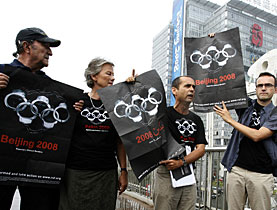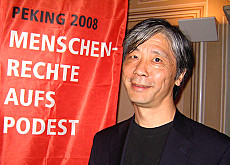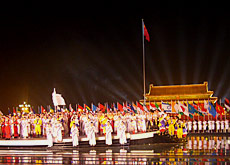NGOs denounce Chinese Olympic controls

Non-governmental organisations (NGOs) have condemned the increase in controls on civilians and the media by the Chinese authorities ahead of the 2008 Olympic Games.
Amnesty International, Reporters without Borders and the World Organisation Against Torture have called for more pressure to be exerted on China to improve civil liberties, especially by the Lausanne-based International Olympic Committee (IOC).
Manon Schick from the Swiss branch of Amnesty International said the Beijing Olympics ought to be an opportunity for a genuine human rights improvement in China.
But at a news conference in Geneva on Monday she said the Chinese authorities had instead cracked down even more.
Amnesty said it condemned the forced displacement of residents from their homes for the Olympics event, punishments for petty crimes, a renewed increase in the number of websites being shut down, the “cleansing” of the Chinese capital by locking people up without a trial and endless house arrest.
Eric Sottas from the Geneva-based World Organisation Against Torture said: “As a general rule progress has been very slow, but the authorities are sensitive to their image.”
Press freedom?
Reporters without Borders says 33 journalists and 55 cyber-dissidents – opponents of the authorities who disseminate information online – are currently imprisoned in China.
The organisation says the law on foreign journalists that was adopted a year ago has not been respected, especially regarding free movement.
It also denounced the Chinese authorities’ desire to file all journalists wanting to cover the Olympics, with the possibility that requests for accreditation could be refused.
“We are disappointed by the lack of involvement shown by the International Olympic Committee,” said Michael Roy, head of the Swiss branch of Reporters without Borders.
In an open letter to IOC president Jacques Rogge, Robert Ménard, the head of Reporters without Borders, said “the IOC’s silence was enabling all the blunders”.
“The IOC has not made one single public statement showing its concern for the lack of freedom of expression which will damage the media’s work and the transparency that is necessary for the Olympic games,” he wrote, criticising “a historic failure in the history of the Olympic movement”.
Boycott
Reporters Without Borders is advocating a boycott of the 2008 games in Beijing, citing its abridgment of press and personal freedoms and the positive effects of earlier Olympic boycotts.
The US-led boycott of the 1980 Summer Olympics in Moscow was part of a package of actions to protest against the 1979 Soviet invasion of Afghanistan. At least 64 countries boycotted the Games.
In a largely tit-for-tat response, 14 nations missed the 1984 Summer Olympics in Los Angeles due to a Soviet-led boycott. Iran was the only country to boycott both Moscow and Los Angeles.
swissinfo with agencies
The Lausanne-based International Olympic Committee awarded the 2008 Olympic Games to Beijing on July 13, 2001. While the people of the city celebrated in the streets, many human rights organisations, dissidents and Tibetan exiles criticised the decision.
Reactions included “historic wrong decision” and “reward for a corrupt regime”. There was even a parallel drawn with the Olympic Games of 1936 which were misused for Nazi propaganda.
Others insisted that the Games offered an opportunity for democracy in China. The IOC was concerned not to put the focus on the human rights issue in choosing the venue for the 2008 Olympics.
The 2008 Olympic Games take place in Beijing from August 8-24. It is the first time they are being held in the People’s Republic.
There are 302 competitions in 28 different sports.
The opening ceremony begins at 8.08pm on 08.08.2008.
Swiss star architects Herzog & de Meuron designed the Olympic stadium in Beijing.
A workforce of about 30,000 is building the Olympic facilities.

In compliance with the JTI standards
More: SWI swissinfo.ch certified by the Journalism Trust Initiative












You can find an overview of ongoing debates with our journalists here . Please join us!
If you want to start a conversation about a topic raised in this article or want to report factual errors, email us at english@swissinfo.ch.